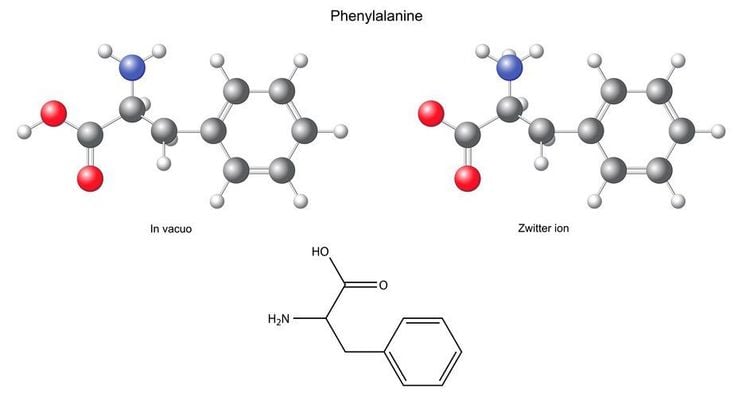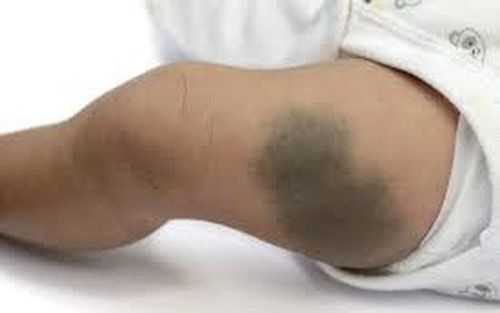This is an automatically translated article.
Phenylalanine is an amino acid used by the body to produce proteins, treat depression and skin-related conditions. However, for people with the genetic disorder phenylketonuria, phenylalanine can be a serious health concern.
1. What is Phenylalanine?
Phenylalanin is an amino acid that makes up proteins in the human body. This molecule exists in two forms as follows:L-phenylalanine: Found in foods and used to make protein in the body. D-phenylalanine: Can be synthesized for use in certain medical applications. The body cannot produce enough L-phenylalanine on its own, so phenylalanine is considered an essential amino acid for the body, which can be obtained through the daily diet. Phenylalanin is found in many foods, including plant and animal sources such as milk, eggs, and meat. Phenylalanin is also sold as a dietary supplement.
2. The role of Phenylalanin
Phenylalanin has an important role for the body as follows:
The body needs phenylalanine and amino acids to produce protein. Protein is important for the brain, blood, muscles and internal organs... Phenylalanin is used to treat a number of medical conditions such as: Skin disorders, depression, and pain relief. Phenylalanin also has an important role in the production of other molecules, including: Tyrosine, epinephrine, norepinephrine, and dopamine. Treatment of Vitiligo: Phenylalanin can be used to treat vitiligo (a skin disorder that causes loss of skin color and dark spots) or to improve skin pigmentation in people with this condition. Treatment for people with depression: Phenylalanin can be used to produce the molecule dopamine. The combination of the D and L forms of the amino acid phenylalanine is effective in treating depression. This has been proven through experimental studies on a number of patients with depression. Alcohol withdrawal: Phenylalanin and other amino acids may help ease symptoms of alcohol withdrawal. Parkinson's disease: The treatment of Parkinson's disease with the amino acid phenylalanine still requires more research.

Phenylalanin được dùng để điều trị một số tình trạng y tế như rối loạn da, trầm cảm và giảm đau.
3. Is Phenylalanin bad for your health?
Phenylalanine is generally safe, not a health concern for most people. Dosage of phenylalanine will be based on individual weight, about 50-100 mg/kg.
However, for people with the genetic disorder phenylketonuria or certain other health conditions, phenylalanine can be a serious health concern.
People with phenylketonuria amino acid metabolism disorder cannot process phenylalanine properly, which can cause brain damage, intellectual disability, and problems with transporting other amino acids to the brain.
Usually, people with phenylketonuria will be put on a special low-protein diet and maintained for life. However, the sweetener aspartame, which contains phenylalanine, is commonly added to many medications, diet foods, and sodas. Therefore, people with phenylketonuria should avoid using products containing phenylalanine. In addition, if aspartame is used in large doses, it can rapidly increase the concentration of phenylalanine in the brain. Therefore, you need to use aspartame products with caution if:
Are taking certain medications, such as monoamine oxidase inhibitors, tranquilizers, or drugs containing levodopa (Sinemet, Rytary). Have a movement disorder. Sleep disorder, anxiety disorder, or other mental health condition, because phenylalanine can worsen feelings of anxiety and restlessness. If you are unsure whether phenylalanine or aspartame will cause negative effects in your body, talk to your doctor for advice and necessary tests.
4. Possible side effects when using phenylalanine
The amino acid phenylalanine is almost safe for healthy people if used in the correct dosage. However, pregnant women should avoid taking phenylalanine supplements.
5. Phenylalanin-rich foods
Plant and animal products containing the amino acid phenylalanine include:
Soybeans, pumpkin seeds. Animal products, eggs, seafood and some meats are high in phenylalanine and other essential amino acids. In summary, Phenylalanine is generally safe, with no health concern for most people. However, people with hereditary disorders of phenylketonuria or certain other medical conditions should consult their doctor before using phenylalanine.
Please dial HOTLINE for more information or register for an appointment HERE. Download MyVinmec app to make appointments faster and to manage your bookings easily.
References: Mayoclinic.org, Healthline.com













